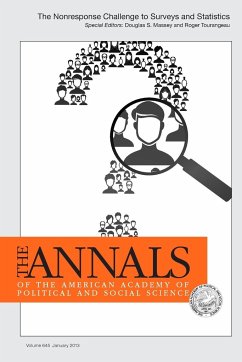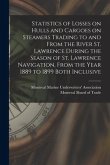Surveys are the principal source of data not only for social science, but for consumer research, political polling, and federal statistics. In response to social and technological trends, rates of survey nonresponse have risen markedly in recent years, prompting observers to worry about the continued validity of surveys as a tool for data gathering. Newspaper stories, magazine articles, radio programs, television broadcasts, and Internet blogs are filled with data derived from surveys of one sort or another. Reputable media outlets generally indicate whether a survey is representative, but much of the data routinely bandied about in the media and on the Internet are not based on representative samples and are of dubious use in making accurate statements about the populations they purport to represent. Surveys are social interactions, and like all interactions between people, they are embedded within social structures and guided by shared cultural understandings. This issue of The ANNALS examines the difficulties with finding willing respondents to these surveys and how the changing structure of society, whether it be the changing family structure, mass immigration, rising inequality, or the rise of technology, has presented new issues to conducting surveys. This volume will be of interest to faculty and students who specialize in sociological movements as well as economic and immigration movements and its effect on surveying.
Hinweis: Dieser Artikel kann nur an eine deutsche Lieferadresse ausgeliefert werden.
Hinweis: Dieser Artikel kann nur an eine deutsche Lieferadresse ausgeliefert werden.


![On Gold-mining and Its Prospects in Nova Scotia [microform]: Embodying the Results of Geological Surveys of the Districts of Waverley and Sherbrooke, On Gold-mining and Its Prospects in Nova Scotia [microform]: Embodying the Results of Geological Surveys of the Districts of Waverley and Sherbrooke,](https://bilder.buecher.de/produkte/66/66168/66168349m.jpg)


![Sailing Directions for the Coast of North America Between Cape Canso in Nova Scotia and New York [microform]: Compiled Principally From the Surveys Ma Sailing Directions for the Coast of North America Between Cape Canso in Nova Scotia and New York [microform]: Compiled Principally From the Surveys Ma](https://bilder.buecher.de/produkte/66/66155/66155678m.jpg)
![Prospectus, Reports and Statistics of the Eureka Gold Mining Company of Nova Scotia [microform]: With a Plan of the Wine Harbour Gold District: Limite Prospectus, Reports and Statistics of the Eureka Gold Mining Company of Nova Scotia [microform]: With a Plan of the Wine Harbour Gold District: Limite](https://bilder.buecher.de/produkte/65/65538/65538242m.jpg)

